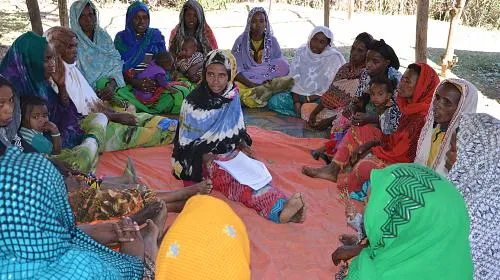ADDIS ABABA – (Dec.14, 2015): Over 10 million people in Ethiopia are in need of emergency food assistance because of the extreme drought caused by the global weather phenomenon El Niño, according to revised figures released by the Ethiopian government Friday.
“Right now families in drought-stricken areas are about to exhaust all available resources to cope with the scarcity of food and water. There is no time to lose in ensuring that they get the assistance they need before it is too late. During the 2002 El Niño year, much of the required food aid was delivered too late to prevent significantly increased malnutrition rates. This is a critical moment for the Ethiopian people and for the international community to step up,” says Garth Van’t Hul, CARE’s Country Director in Ethiopia.
“We are also greatly concerned by the disproportionate burden this crisis is placing on women and girls, who are largely responsible for ensuring families have food and water. Women we talk to in affected areas are currently spending all day every day walking to get drinking water or collecting and selling firewood to have some money for food,” says Van’t Hul.
CARE supports the Ethiopian government’s effort to provide relief, with food distributions to more than 360,000 people, assisting over 100,000 children and mothers affected by malnutrition and helping 41,000 people access safe drinking water. Existing efforts are not sufficient, however, to cover the growing needs. The Ethiopian government has requested more international assistance, but huge funding gaps remain.
CARE also supports vulnerable communities to strengthen their resilience to future crises through support for livelihoods, drought resistant seeds distributions, savings and loans groups and promoting gender equity.
“As a result of climate change, extreme weather events such as the current drought in Ethiopia will occur more frequently, making life even more difficult for the world’s poorest. We have to do everything we can to prevent the loss of life, but providing emergency relief will not be enough,” says Van’t Hul.
“In addition to reducing emissions and preventing the worst scenarios of global warming, poor and vulnerable communities need support to adapt and be able to cope without depending on food aid. Communities who have seen their crops fail completely say that savings and loans groups have helped them cope for longer, but that they have now depleted accumulated resources and they have no more money.”
About CARE
Founded in 1945 with the creation of the CARE Package®, CARE is a leading humanitarian organization fighting global poverty. CARE places special focus on working alongside poor girls and women because, equipped with the proper resources, they have the power to lift whole families and entire communities out of poverty. Last year CARE worked in 90 countries and reached more than 72 million people around the world. To learn more, visit www.care.org.
For media requests, please contact:
Holly Frew, hfrew@care.org, or 1 404-979-9389 (o) or 1-770-842-6188 (c)

